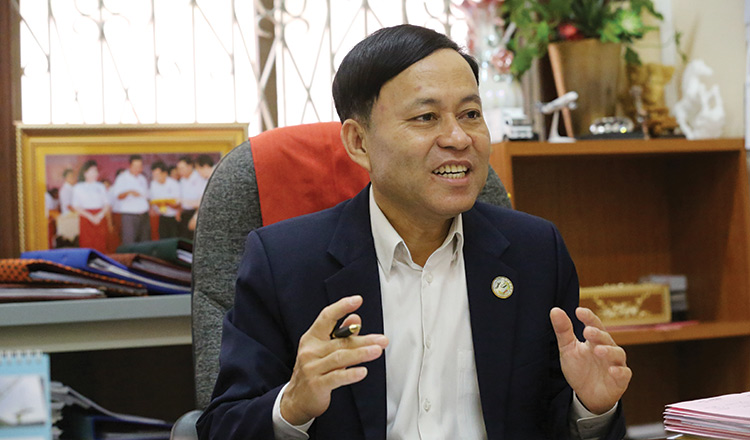Cambodia: A discussion on the logistics sector: Q&A with CAMFFA
Khmer Times’ Sok Chan sits down with Sin Chanthy, president of the Cambodia Freight Forwarders Association (CAMFFA), to discuss the challenges and opportunities in the local logistics sector, the role of the new National Council of Logistics, and what he expects from the upcoming logistics master plan.
KT: CAMFFA recently held its 14th annual meeting. Can you tell us about the topics that were discussed during the event?
Mr Chanthy: Many issues were raised by our members during the meeting. We discussed the National Council of Logistics and the new master plan for the country’s logistics sector, both of which will be launched this month. Another issue was the single-window system for the sector, which will also come online later this year.
Likewise, we tried to devise ways to improve the training provided to our members and get them to comply to a larger degree with the law, including paying taxes. Our overall objective is to boost the competitiveness of the sector while increasing transparency.
A key issue, as always, was the infamous high cost of transportation in the country. We focused on the elimination of unofficial fees, which is one of the main reasons why is so expensive to move cargo around in the kingdom. We are determined to solve this issue and are liaising with Camcontrol and the General Department of Customs and Excise to find a solution.
KT: What are other factors that play a role in the high cost of logistics in the country?
Mr Chanthy: A major issue is that we only have one way trade. For example, after a truck delivers its cargo to the port, it returns to the production centre empty. Also, we don’t have adequate infrastructure to connect production areas to the ports. Our roads are simply too small to allow trucks to travel at the appropriate speed. Finally, the logistics automation system is not synchronized across all ministries, which hampers import and export operations. We know that the government is working on this issue, but we don’t know how long it will be before they fix the problem.
KT: What initiatives would you propose to bring down the cost of transportation in the country?
Mr Chanthy: While I believe that we have already solve many of the issues facing the sector, the big challenge still remains: unofficial fees. The problem is that when we pay unofficial fees, we don’t get a receipt that we can use when we file taxes. We cannot present these unofficial fees as a deductible expense, so it ends up being a big loss for companies in the industry. I believe what we need here is greater cooperation with relevant government agencies. We all need to work together to solve this issue.
KT: What are your expectations with regards to the upcoming logistics master plan and the National Council of Logistics?
Mr Chanthy: Having a master plan and one institution devoted to the logistics sector won’t solve all our problems overnight. We need more cooperation among all stakeholders and the relevant government bodies. To make the logistics system better, we need the involvement of the Ministry of Public Works and Transport, the Ministry of Commerce, the Ministry of Industry and Handicraft and the Ministry of Agriculture, Forestry and Fisheries, among others. They must all be connected to the national logistics automation system.
KT: Compared to other Asean nations, how does Cambodia fare when it comes to the cost of transporting cargo?
Mr Chanthy: If we are talking about soft infrastructure, we are not doing bad; we are probably sixth among all Asean members. We have adopted many laws to support the sector, and this is a great achievement in and of itself.
However, in terms of physical infrastructure, we are one of the worst in the region. We only have two-lane roads which are not ideal for truck traffic. Another weakness is that we use mostly secondhand vehicles.
KT: The government is now cracking down on companies that do not comply with maximum weight and length regulations as they apply to trucks. Many transportation companies have complained about the government being too strict when it comes to applying the law in this cases. What can be done?
Mr Chanthy: We still don’t have a solution for this. By law, trucks cannot have more than 16 metres in length and 2.5 metres in width. However, we see trucks on our roads that are as long as 18 metres and as wide as 2.6 metres.
The problem is that we don’t manufacture trucks in Cambodia; we import them. We import a lot of them for the US, a nation that has different regulations when it comes to trucks dimensions, and which allows for bigger trucks on the roads. When we import these trucks, we go the legal route: we pay taxes, register the vehicle and conduct annual technical inspections. So, it is all legal, yet we are at odds with our own law.
We ask the government to allow the circulation of trucks that have already been imported and are already in use, even if new imports are completely banned. This will allow companies to keep running their businesses.
KT: Do you have any other words or recommendations, either for the government, the public or transportation companies?
Mr Chanthy: Yes. I’d like to remind them that our economic system is completely dependent on our ability to move cargo around the country efficiently. Thus all stakeholders must do their part to improve the transportation and logistics sector. Our association is working hard to up the skill level and professionalism of companies in the sector. We ask the government to speed up work to link up every relevant agency to the logistics automation system and to digitalise processes to reduce paper-based bureaucracy and increase efficiency.
Source: http://www.khmertimeskh.com/50113480/a-discussion-on-the-logistics-sector-qa-with-camffa/


 Thailand
Thailand




